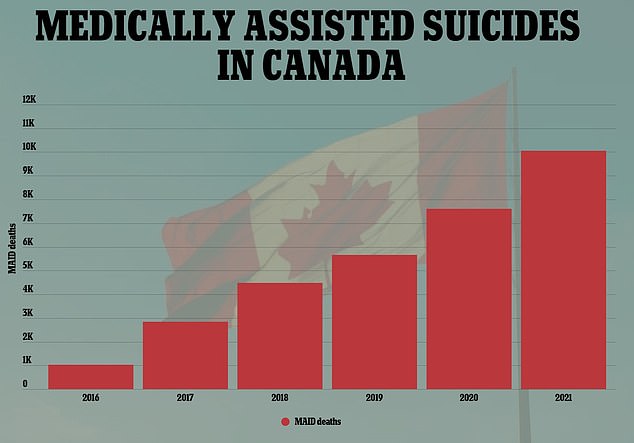Canada to legalize euthanasia for DRUG ADDICTS with no other illness in March
Canada will legalize euthanasia for people addicted to drugs next year, in a move activists liken to “eugenics.”
When the country’s medically assisted dying (MAID) law changes in March 2024, mental health patients, including those with substance abuse disorders, without physical conditions, will be able to request assisted suicide.
A special parliamentary committee will re-examine the move ahead of the rollout in coming months, following divergent views among Canada’s political parties.
More than 10,000 Canadians were euthanized in 2021, a tenfold increase from 2016, when the practice was legalized. In some cases it concerned people who lived in poverty and wanted to die.

MAID became legal in Canada in 2016. Since then, the rules on who is eligible have been relaxed several times – and rates have increased tenfold to around 10,000 cases in 2021
The assisted death process in Canada begins with downloading a form online.
This involves the applicant answering a series of check box questions and signing the bottom, followed by securing the signature of witnesses. A telephone call and a home visit from a doctor will then follow.
If the application is approved by two separate doctors, the person must wait 90 days from the time of the application, after which a doctor can administer the lethal drug via injection.
Currently, people who have only mental health conditions, such as depression and personality disorders, without physical conditions, are not eligible for assisted suicide.
A framework for assessing people with substance use disorders for MAID will be discussed at an annual scientific conference held this week in Canada.
The workshop’s agenda includes teaching participants and medical professionals how to “know the difference between suicidality and a reasoned wish to die.”
Dr. David Martell, chief physician for Addiction Medicine at Nova Scotia Health, who presented the framework at the conference, said VICE News: ‘I don’t think it’s fair, and the government doesn’t think it’s fair, to exclude people from participating because their medical condition or their suffering is related to a mental illness.
“As a subset of these, it is not fair to exclude people from participation simply because their mental health disorder may be wholly or partly a substance abuse disorder. It has to do with treating people equally.’
Dr. Martell said suicidality can be related to a serious, sudden crisis or can occur in someone with a long-term psychiatric illness.
Someone with a reasoned death wish is someone who ‘thinks in a calm and measured way about the wish for (their) suffering to end, and can reason through it.’
He added that people can show signs of both, making it difficult to assess. In addition, it would be “fairly impossible” to distinguish whether the person was under the influence of drugs or alcohol, he said.
Currently, people are eligible for MAID if they have a “severe and irreversible medical condition,” such as a serious illness or disability, that has caused them to deteriorate irreversibly.
To be approved for MAID, people must undergo two assessments from independent healthcare providers.
Zoë Dodd, a harm reduction advocate from Toronto, told VICE News that the practice is tantamount to eugenics.
She said, “I just think that now that MAID has moved into the field of mental health and substance use, it’s really rooted in eugenics.
“And there are people who are really struggling with substance use and those people aren’t really getting the support and help that they need.”
Drug users and harm reduction advocates also told VICE News they are considering public health methods, such as increased access to overdose prevention sites and medications like methadone, which are used to treat opioid use disorder.
They said a regulated drug supply and more housing and employment would also help.
Dr. Martell, who has been a MAID provider herself since 2016, agrees that health care options for people with substance use disorders are underfunded.
He said he hasn’t heard any desire for assisted death from his substance abuse patients, telling VICE, “The idea that we could promote or push this on people doesn’t appeal to me at all.”
